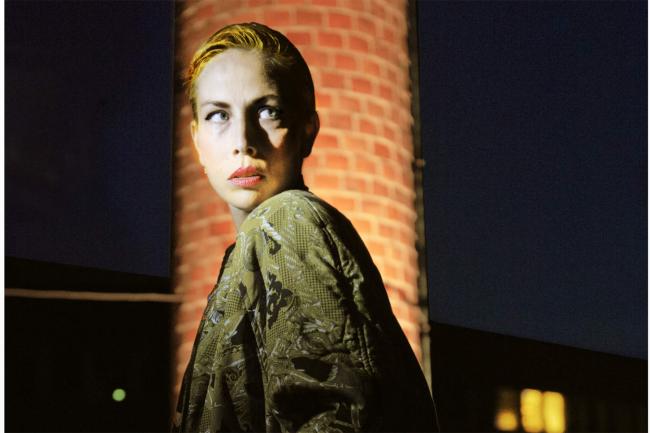Music producers have the opportunity to build their own universe
2025-09-23What does your life actually sound like? Jenny Wilson, adjunct professor at Ingesund School of Music, believes that your personal life journey is the most exciting thing about you as a songwriter, producer, and artist. What is your story, and how do you share it? Daring to experiment with music is something close to Jenny’s heart, and she will continue doing just that with the students in the music production program for another year, with support of the Wettergren Foundation.
Throughout your career, you’ve created productions and works that reflect your life. Some parts include traumas you’ve experienced. Hasn’t it been scary and difficult to make your experiences public?
“Throughout my solo career, all my albums have had different themes. The first album was about growing from child to adult, the second was about parenthood (and all the tough parts no one talks about), the third was about when I got breast cancer, and the fourth was about a rape I experienced. The latter was very difficult to make; I was very scared and talked to many friends and acquaintances to prepare myself. I was “lucky” that the Me Too movement started around the same time as the release, which meant I ended up in a warm embrace where it was completely okay to talk about these things. It’s so sad because I wouldn’t judge anyone else for having gone through something like that, but I have judged myself. As an artist, I’ve taken care of my life events and turned them into art. My works aren’t just scattered songs; everything is connected through different themes – it becomes a deeper expression.”
You’ve written about some heavy topics. How do you work with your students around your productions?
“I try to talk to them about the advantage of using their own experiences, not just in lyrics but also in production. The important thing isn’t what technical equipment you have, but that you shut yourself into your own little world. Even if you only have a pump organ to work with, you use it to create your own universe. You should have a vision and not strive to sound like someone else – you should stick to what is uniquely you. Music production can be very technical, but as a producer, you also have a platform for other kinds of expression.”
Is it easier to write music about difficult experiences than about happiness in life?
“I need to feel a sense of meaning in what I do, and it just so happens that a lot has happened in my life, including some heavy events. For art to be interesting, you need to show all your colors in what you create, but at the same time, there must be a glimmer of light in the darkness and a different perspective on what makes you happy.”
Do you think musicians generally become more “interesting” songwriters/artists over time with more life experience?
“Yes, I think so. It’s hard being young in any art form; life experience adds more substance. Maybe you stop seeing things in black and white as you get older. At the same time, young people are fascinating because their brains are still developing. The most important ingredients as an artist are curiosity and courage. That has nothing to do with age. If you have those, you’ll be able to create interesting things.”
Writing and performing music is about touching people. Is it important to be completely honest and vulnerable as a songwriter, or do you think you can also move people with a light-hearted pop song?
“Absolutely, I believe that. The most important thing is to be true to yourself. What do I want to say, and above all, why? You can also be a skilled craftsman rather than an artist. Students vary in how they view this. But I talk to them about how this can also be an art form – you’re both a director and an artist in this profession. It’s very much about how you see yourself as a producer and songwriter.”
Being More Experimental Than Results-Oriented
In a workshop you hold for your students, they get one hour to write a piece of music. Can you tell us more about that?
“We work with a deck of cards inspired by Brian Eno’s “Oblique Strategies,” where you draw a card with various, more or less abstract, prompts. An example might be “do it backwards” or “emphasize the silence.” Everyone interprets their prompt in their own way and goes off for about 40 minutes, then comes back and draws a new card with a new prompt to continue working on their song. It’s about experimenting without being too focused on the result; the goal is to experiment rather than to produce. The students approach these exercises in very different ways, which is so cool because everyone is unique.”
At the music production program at Ingesund School of Music, your focus is songwriting, but you’re also an artist who works with stage art, and your videos are also small works of art. Is it important for an aspiring artist to consider more aspects of their artistry than “just” songwriting and sound production?
“That really depends on how you think about your profession and how you build your universe. But as an artist, it’s very important to think about “the whole package”—the entire visual aspect with album covers, videos, clothes, and so on. The whole sends a signal. Of course, you can release an album with a blank cover, because even that sends a statement. We’re bombarded with all sorts of things every day, so it’s important to consider what signals you want to send.”
How can you recognize a song signed by Jenny Wilson?
“I think all my songs are accessible, with catchy beats and playful productions. They’re meant for dancing, loving, jogging, living—they should be a physical experience to listen to and to attend my shows. Really, it’s only one of my albums that is consistently dark, and that’s “Trauma,” which is a fusion of full symphony orchestra and my electronic world. It deals, in an almost hair-raisingly explicit way, with the rape I also described on the more danceable album “Exorcism.”
This year, you composed the opera “Älskarinnorna” at Norrlandsoperan, which premiered in earlier this year. What did Jenny Wilson sound like then?
“You can hear my melodic language and how I work with rhythms, but this is written for symphony orchestra and eight opera singers. And it’s different—here you get a script, that is, a libretto, and a story that needs to be told scene by scene. This was my first opera, but the director of Norrlandsoperan actually pointed out that he thinks my albums are like little operas, since they always contain a story with strong drama.”
You’ve had your assignment as adjunct professor at Ingesund School of Music extended for another year. How has the past year been, and what do you see in the kaleidoscope for the coming year?
“It’s been a lot of fun, a completely new task for me. Now I feel more comfortable in the role, and I’m very grateful to spend time with young, talented students who are in the process of defining themselves as songwriters and producers. I want to continue exploring the experimental with them and get them to look inward and feel the greatness and freedom of creating art.”
The music industry is a tough business. What do you want to pass on to your students as they eventually enter the professional world?
“That’s a good question. The music industry is in constant motion and upheaval. It’s extremely difficult to make a living from your music because Spotify has completely killed record sales. At the same time, there are fewer and fewer concert venues, music magazines, culture sections, and basically all exposure for music is relegated to highly commercial channels. It’s sad. We live in a culture of contempt, and it’s driven by politics, both here at home and globally. So my only advice is to find out what is truly important to you. Why do you want to do this? Do you love doing this? Because it’s your inner drive and your own crazy passion that are required to navigate a world that is constantly changing.”
The Berit and Carl-Johan Wettergren Foundation donates funds to charitable purposes, mainly within the forest industry, medicine, research, and education. The foundation’s current focus is scientific research and education with a priority on culture.
A Guest Professor can be recruited for research, development, and educational work when expertise from outside the university is valuable and is preferably financed with external funds. The current person should have scientific and pedagogical skills at the professorial level. However, it is in the nature of the employment form that the competence area can be more limited. Outstanding contributions within, for example, engineering or artistic activity can partially replace the requirement for traditionally documented scientific or artistic skill.



